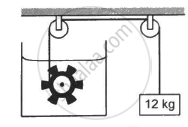Advertisements
Advertisements
Question
Derive an expression for finding out the specific heat capacity of a body (solid) from the readings of an experiment given below:
(i) Mass of empty calorimeter (with stirrer) = m1 gm
(ii) Mass of the metal piece = M gm
(iii) Mass of colorimeter and water = m2 gm
(iv) Initial temperature and water = t1°C
(v) Temperature of hot solid (metal piece) = t2 °C
(vi) Final temperature of the mixture = t°C
(vii) Specific heat of calorimeter = 0.4 J gm / °C
Solution
Lets J gm / °C be the specific heat of the solid
(i) Fall in temperature of hot solid = (t2 - t) °C
(ii) Rise in the temperature of calorimeter as well as water = (t - t2) °C
(iii) Heat taken up by calorimeter = m1 × 0.4 × (t - t1) °C
(iv) Heat taken up by water = (m2 - m1) × 4.2 × (t - t1)°C
(v) Heat given out by hot soild = M × s × (t2 - t)°C
Now, heat given out by hot solid = Heat taken up by calorimeter + Heat taken up by water
or Ms (t2 - t) = m1 × 0.4 (t - t1) + (m2 - m1) × (4.2 × (t - t1))
From this heat equation, 's' can b e calculated where all other values are known.
APPEARS IN
RELATED QUESTIONS
Ice cream appears colder to the mouth than water at 0℃. Give reason.
The global warming has resulted:
(a) the increase in yield of crops
(b) the decrease in sea levels
(c) the decrease in human deaths
(d) the increase in sea levels
Figure shows a paddle wheel coupled to a mass of 12 kg through fixed frictionless pulleys. The paddle is immersed in a liquid of heat capacity 4200 J K−1 kept in an adiabatic container. Consider a time interval in which the 12 kg block falls slowly through 70 cm. (a) How much heat is given to the liquid? (b) How much work is done on the liquid? (c) Calculate the rise in the temperature of the liquid neglecting the heat capacity of the container and the paddle.

A vessel of negligible heat*capacity contains 40g of ice in it at 0°C, 8g of steam at 100°C is passed into the ice to melt it. Find the final temperature of the contents of the vessel.
(Specific latent heat of vaporization of steam = 2268 J/g, specific latent heat of fusion of ice = 336 J/f and specific heat capacity of water = 4.2 J/g°C)
An electric immersion heater is rated 1250 W. Calculate the time in which it will heat 20 kg of water at 5°C to 65°C.
Define specific heat capacity.
Two metals A and B have specific heat capacities in the ratio 2:3. If they are supplied same amount of heat then
Which metal piece will have greater mass if the rise in temperature is the same for both metals?
Two cylinders of equal height and radius are made of copper and aluminum. Which of them conducts heat faster?
Observe the following diagram and answer the questions given below:

Specific heat capacity of metals
- Which element has maximum specific heat capacity? Justify.
- Which element has minimum specific heat capacity? Justify.
- Define specific heat of object.
